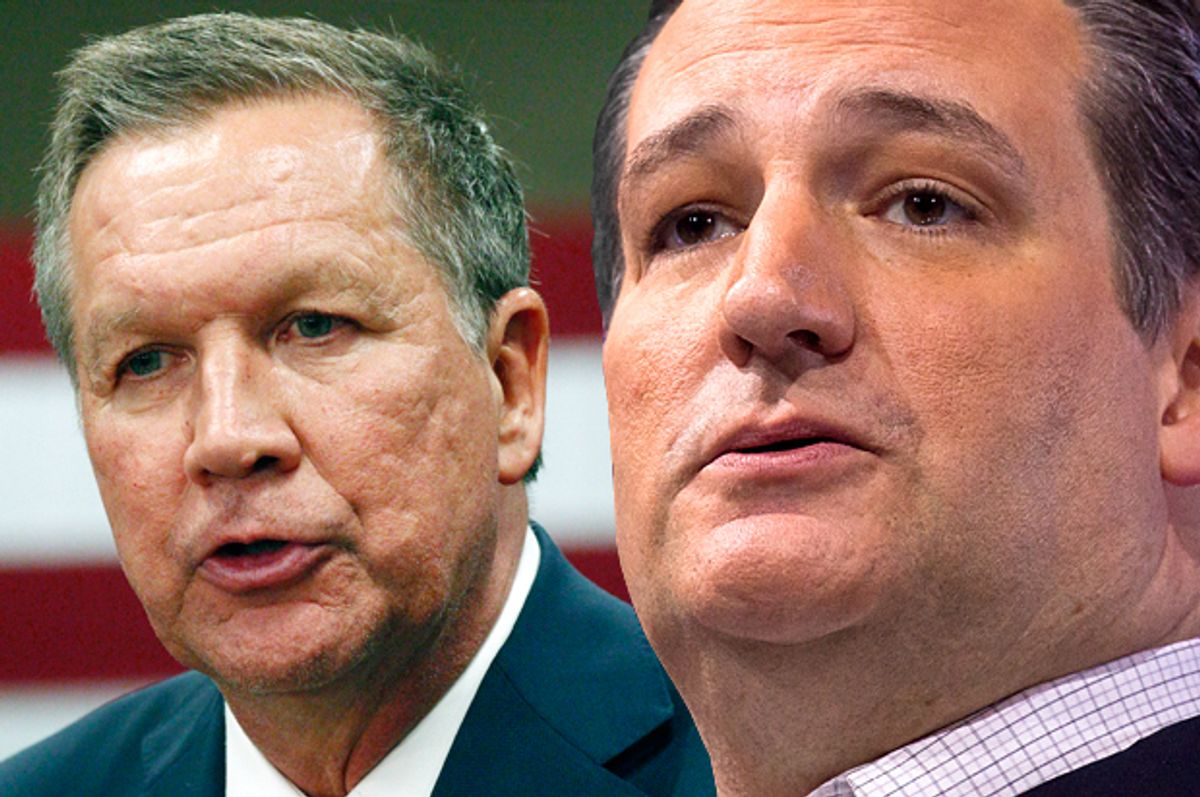There was a time, not that long ago, when some important people within the Republican Party were so desperate to stop Donald Trump that they floated the idea of strategic alliances among the non-Trump candidates. In early March, Mitt Romney gave a big speech lashing out at his party’s presidential frontrunner and imploring the remaining candidates to coordinate among themselves and deny Trump primary victories wherever they could. “Given the current delegate selection process,” Romney explained, “this means that I would vote for Marco Rubio in Florida, for John Kasich in Ohio, and for Ted Cruz or whichever one of the other two contenders has the best chance of beating Mr. Trump in a given state.” This sad, frantic proposal was the best Romney could come up with, and at the time both Ted Cruz and John Kasich told him to stuff it.
Marco Rubio, who was at that point careening towards an embarrassing exit to the race and had nothing to lose, actually told his Ohio voters to support Kasich. In return, Kasich’s people told the Rubio campaign to slink off and die in the gutter of its choosing. At the same time, Cruz ramped up his spending and staffing in Florida to split the anti-Trump vote and throw the state to Trump, thus removing Rubio as a rival. Their strategic thinking was clear and rational: they each considered themselves the stronger of the anti-Trumps and wanted to get to a one-on-one race. Cooperation, while noble in the eyes of outside observers, wouldn’t help them reach that goal.
Now they find themselves in a precarious, yet all too predictable position. Trump just won New York by a huge margin. He’s poised to win several states tonight by large margins. His delegate lead is growing, while both Cruz and Kasich are mathematically eliminated from securing a bound-delegate majority ahead of the convention. So now, nearly two months after Mitt Romney suggested candidate cooperation as a desperate last-ditch effort to stop Trump, Kasich and Cruz have reached an arrangement to cooperate to stop Trump.
It goes like this: Cruz will focus his attentions on Indiana while Kasich will camp out in Oregon and New Mexico, and they’ll both stay out of each other’s way and give themselves the best shot possible to steal those states away from Trump. It’s a fine idea in theory, but in practice it’s a disaster, which is probably why Kasich and Cruz resisted it for so long.
First of all, as my colleague Sean Illing points out, back-channel scheming of this sort only serves to validate Trump’s complaint that forces within the Republican Party are conspiring to rig the outcome of the primaries. How could he not claim that his griping about an anti-Trump conspiracy has been vindicated when his rivals are openly conspiring against him?
And, of course, the “deal” between the two doesn’t actually carry any promise of strategic voting. “Mr. Cruz’s campaign privately advised supporters on Sunday not to endorse tactical voting, whereby his supporters might switch their allegiance to Mr. Kasich in states where the Ohio governor is running stronger against Mr. Trump,” the New York Times reported shortly after the “deal” was announced. Kasich, for his part, told reporters that Indiana voters “ought to vote for me,” despite the fact that he had agreed to turn the state over to Cruz. So they’re in this weird, nebulous arrangement in which they’re not endorsing each other, but also not campaigning against each other, but also encouraging their supporters to stay loyal, while also warning of the existential danger of a Trump victory.
This is a particularly bad look for Ted Cruz, given the time he’s devoted to presenting himself as the man who would win by being unapologetically conservative and unwavering in his dedication to his principles. He complains so often of the “Washington Cartel” making deals of convenience that only serve to further political ambition. He cut a big anti-Trump ad inveighing against the very notion of making “deals.” And now he’s come to this arrangement with Kasich to keep his political prospects alive – what does Kasich get out of it? What does Kasich expect he’s going to get? Whatever it is, Cruz has now agreed to let another candidate dictate how he’ll run his campaign operation.
We’ll know soon enough whether this last-second gamble will pay off. The May 3 Indiana primary is shaping up to be critical for Trump’s path to a 1,237 delegate majority, and as of this moment Trump is leading Cruz by something like six or seven points. If this cockamamie pseudo-alliance is going to stop Trump, it will have to work fast.



Shares